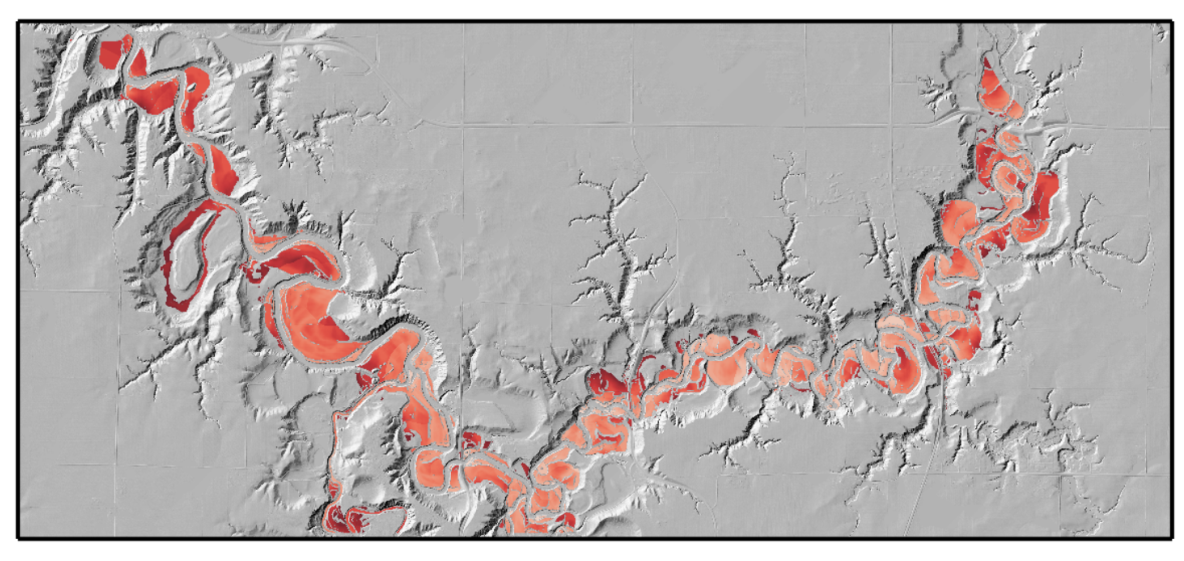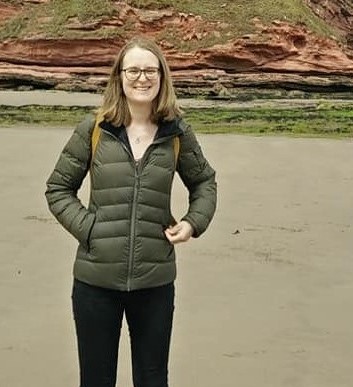Earth surface processes and geohazards at Durham University
I am a geomorphologist studying the interactions between the shape of Earth’s topography, surface processes, tectonics, and climate. Please see my Research page for details of past, future, and current projects.
My research involves developing open-source software for analysing topographic data. I particularly focus on dealing with high-resolution data derived from lidar point clouds. I’ve been developing this software, called LSDTopoTools, along with colleagues at the University of Edinburgh, University of Glasgow, and Queen Mary University of London. See our LSDTopoTools website for more details, or check out our GitHub organisation. We have developed lots of novel techniques for analysing topography, such as extracting channel networks, delineating floodplains and river terraces, automatically measuring valley width, and calculating hilltop and hillslope metrics.

River terraces along the Le Sueur River, Minnesota, automatically extracted using LSDTopoTools
Opportunities
I’m currently interested in recruiting for PhD and post-doctoral positions in tectonic geomorphology, fluvial geomorphology, geohazards, and topographic analysis. Please get in touch with ideas for potential projects and we can discuss funding opportunities.
Post-doctoral fellowships
There are a number of different fellowships which you can apply for to work at Durham University. Please note that all these schemes are competitive and require a strong CV and project idea. I’m happy to help support interested candidates! Potential schemes are:
- Addison Wheeler Fellowships: 3 years funding for early stage researchers who have already achieved a PhD. Deadline is around February each year: more information
- Newton International Fellowships: 2 years for non-UK researchers who wish to work in the UK: more information
- Leverhulme Early Career Fellowships: 3 years funding for early stage researchers: more information
PhD opportunities
Durham University is part of the NERC-funded IAPETUS2 DTP, which has a number of PhD studentships available each year. See the IAPETUS2 website for more details of available projects and deadlines.
Current PhD students
- Mel Oliveira-Guirro, Durham University, Scaling sediment connectivity in fluvial systems. Co-supervised with Prof Rebecca Hodge and Dr Laura Turnbull-Lloyd.
- Anya Towers, University of Edinburgh, The role of coarse sediment in Scottish rivers. Co-supervised with Prof Simon Mudd, Dr Mikael Attal, and the Scottish Environmental Protection Agency.
- Eliot Weir, Durham University, Rivers in the Himalaya: climatic and tectonic controls on the preservation of terraces. Co-supervised with Prof Alex Densmore and Dr Martin Hurst.
- Edmund Lea, Durham University, Decoding glacial landscapes using automated geomorphological mapping and machine learning. Co-supervised with Dr Guy Paxman and Prof Neil Ross.
- Hakan Hazzard, Durham University, Exploring the landscape beneath the Antarctic Ice Sheet and its influence on ice behaviour. Co-supervised with Prof Stew Jamieson, Dr Tom Jordan, and Prof Neil Ross.
Current Post-Doctoral Research Associates
Dr Erin Harvey, Durham University, Dynamic risks for cascading Himalayan hazards. Starting January 2025. Co-advised with Dr. David Milledge (Newcastle)
Dr Aude Lurin, University of Rennes, Controls on valley-floor width and lateral erosion rates in confined mountain valleys. Starting February 2025. Co-advised with Prof Philippe Steer and Dr Boris Gailleton (Univ. Rennes)
